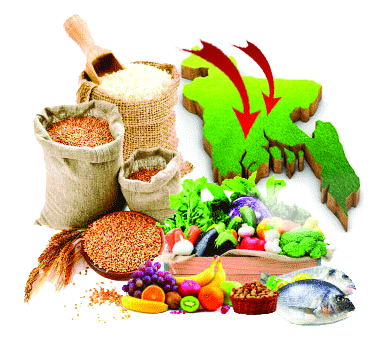Bangladesh third in food imports
Zarif Mahmud: Bangladesh has risen to the third position in the world among food importing countries. In 2021, Bangladesh imported about 100 million tons of food products from the world market.
According to FAO, in 2021, Bangladesh produced 9.33 million tons of agricultural products. In the same year, about 100 million tons of food products were imported from the world market. Wheat, edible oil and milk powder still account for the largest share of food import expenditure.
Citing high prices of import-dependent food products in Bangladesh, FAO says, per capita consumption of nutritious foods such as cooking oil, meat and milk is the lowest. However, the people of the country are in a good position in terms of per capita consumption of food products such as rice, vegetables, fish and fruits produced in the country.
According to the FAO report, the position of Bangladesh in the export of food products is at the bottom. Bangladesh ranks third among the world’s food importing countries. China is the top importer. Philippines in second place. And the top five countries in the world in terms of food exports are USA, UK, Germany, China and France respectively. In this regard, the position of Bangladesh is at the very end.
However, among the world’s six main food products, Bangladesh is only in the third position in rice production. Bangladesh is not among the top five countries in the production of wheat, maize, sugar, edible oil and potato among the remaining major agricultural products. In previous years, Bangladesh used to import the first four products. There was no need to import potatoes. Rather, Bangladesh used to export potatoes. Due to the sudden increase in potato prices this year, Bangladesh has entered the list of potato importing countries.
Bangladesh Institute of Development Research (BIDS) Director General Binayak Sen said, ‘We have an opportunity to increase the production of agricultural products like sugarcane and onion. India has been quite successful in this regard. He further said that Bangladesh is dependent on India for the import of necessary food grains like wheat. But recently India has imposed restrictions on several important food exports including wheat, onions. Some countries are exporting them on the basis of quota.
According to the FAO report, Bangladesh’s dependence on food imports from the world market is increasing. In 2010, while Bangladesh imported 9.3 percent of its total food demand, it increased to 11.2 percent in 2022. Imports of rice, wheat and edible oil are continuously increasing during this period. However, due to the dollar crisis, rice has not been imported this year compared to last year. Imports of wheat also fell by about 30 percent compared to normal.
The report shows the per capita consumption of food energy in all the countries of the world including Bangladesh. On average, every person in the world consumes 2 thousand 978 calories or food energy per day. In Asia it is an average of 2,931 calories. Per capita food energy consumption of Bangladesh is 2,614 calories. 1,288 calories of the total food energy of Bangladesh comes from rice and wheat or grain food. Then there are 203 calories from edible oil, 83 from sugar, 94 from fruit and 175 from potatoes. Bangladeshi people consume only 20 calories from meat, 55 calories from milk and eggs, 40 calories from soft drinks and 52 calories from fish.
According to FAO, Bangladesh is ranked among the top 10 countries in the world in the production of 22 agricultural products. It includes products like rice, lentils, potatoes, onions, tea, as well as different types of fruits. In the last decade, Bangladesh has been added to the top list in the production of some products such as pumpkin, cauliflower and homogeneous vegetables.
President Joe Biden tests positive for COVID-19 while campaigning in Las Vegas, has ‘mild symptoms’
International Desk: President Joe Biden tested positive for COVID-19 while traveling Wedne…








